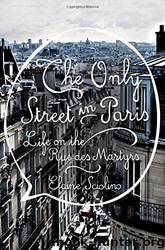The Only Street in Paris: Life on the Rue Des Martyrs by Elaine Sciolino

Author:Elaine Sciolino [Sciolino, Elaine]
Language: eng
Format: epub
Tags: Non-Fiction, Travel, History, Biography, Adventure
ISBN: 9780393242386
Google: IedwBgAAQBAJ
Amazon: 0393242374
Goodreads: 24724583
Publisher: W. W. Norton & Company
Published: 2015-11-02T00:00:00+00:00
I NEVER WOULD HAVE talked about religion in my proper, refined neighborhood off the rue du Bac. But along the rue des Martyrs, religion is a natural part of life. Stories emerge when you least expect them. One day I met with Jean-Michel Rosenfeld to learn about the Jean-Jaurès Foundation, a scholarly organization named after the founder of modern French socialism. The foundation is run out of a building in the Cité Malesherbes, the private gated street halfway up the rue des Martyrs. Rosenfeld worked for forty years as a special counselor to Pierre Mauroy, a Socialist leader who was prime minister for three years in the early 1980s under President François Mitterrand. “I was with Mauroy when he died,” Rosenfeld recalled. “I closed his eyes for the last time.”
Although he is retired, Rosenfeld serves as the foundation’s volunteer spokesman. He told me the complicated story of the building. It was constructed as a private home, then transformed into a single-room-only residence, “the kind of place where lonely people live.” Rosenfeld lowered his voice and added, “It is believed it was also a house for extramarital assignations.” During World War II the Nazis requisitioned the house. “The bastards,” he said. “One version of the story is that it became a private bordello for German officers.”
After the war, the Socialists worked in secret here. Mitterrand himself came on a regular basis before he was elected president in 1981.
“If only these walls could tell their stories,” said Rosenfeld.
Our conversation meandered, and he began talking about the Nazi Occupation. And Jewishness. His Jewishness. “It’s such an honor for me, a descendant of poor Jews from a miserable Polish shtetl, to have been awarded the Legion of Honor,” he said. “And I was interviewed by Steven Spielberg for his film Schindler’s List. I’m in his archives!”
Rosenfeld was five and living in Paris when his father left in 1939 to fight with a French unit of mostly Jewish soldiers. His father was captured and imprisoned by the Germans. Rosenfeld said that when the Nazis occupied France and then began deporting Jews to death camps, he and his mother were allowed to stay in the country. “My mother was French, a Jewish Frenchwoman, and my father was a prisoner of war,” he recalled. “There was a law that protected the wives of prisoners, as long as they were French. If they were foreigners, they would be deported.”
Without money for a hiding place in the countryside, they remained in Paris throughout the war, wearing yellow Stars of David that identified them as Jews. They had little money, food, or heat, but they survived.
Every day, Rosenfeld wears a badge of honor in the left lapel of his jacket: a small red rosette that signifies his status as an officier of the Legion of Honor. But that was not the emblem he wanted to show me now. “I always have with me—” His voice stopped in mid-sentence.
He opened his wallet and pulled out something wrapped in clear hard plastic: a six-pointed yellow cloth badge with the word Juif in faux Hebrew lettering.
Download
This site does not store any files on its server. We only index and link to content provided by other sites. Please contact the content providers to delete copyright contents if any and email us, we'll remove relevant links or contents immediately.
Spell It Out by David Crystal(35342)
Underground: A Human History of the Worlds Beneath Our Feet by Will Hunt(11250)
A Year in the Merde by Stephen Clarke(4647)
Venice by Jan Morris(2045)
Claridge's: The Cookbook by Nail Martyn & Erickson Meredith(1958)
My Paris Kitchen: Recipes and Stories by Lebovitz David(1889)
A TIME OF GIFTS by Patrick Leigh Fermor(1843)
The Plantagenets by Dan Jones(1610)
Welcome to the Goddamn Ice Cube by Blair Braverman(1593)
Bang Poland: How To Make Love With Polish Girls In Poland by Roosh V(1583)
Top 10 Prague (EYEWITNESS TOP 10 TRAVEL GUIDES) by DK(1562)
From Russia with Lunch by David Smiedt(1550)
The Finnish Way by Katja Pantzar(1531)
The Isle of Mull by Terry Marsh(1516)
A TIME TO KEEP SILENCE by Patrick Leigh Fermor(1496)
A Taste of Paris by David Downie(1488)
Rick Steves London 2018 by Rick Steves & Gene Openshaw(1487)
Merde in Europe by Stephen Clarke(1431)
Insight Guides Experience Tokyo by Insight Guides(1414)
